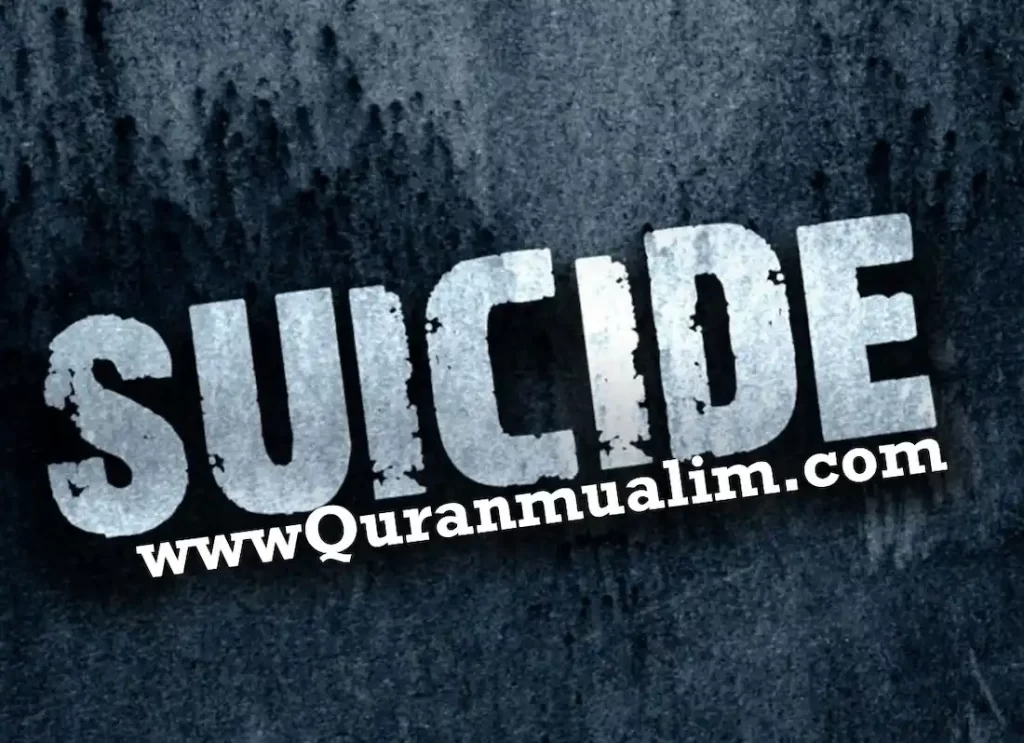Suicide in Islam – “Whoever saves a life, it will be as if they saved all of humanity” Qur’an 5:32
Suicide is clearly prohibited in Islam however, it does not mean Muslims don’t have suicidal thoughts or commit suicide. Suicide is a complex issue. There are many factors that influence the risk of suicide for a person and include biological factors such as genetic characteristics which increase the susceptibility of a person to mental health issues and psychological issues like feeling of hopelessness and worthlessness social variables like the quality and type of the relationships a person has with others, as well as spiritual aspects like one’s moral and ethical convictions.
Muslims as well as the rest of us are affected by these different biological and psychological, social and spiritual aspects. For Muslims living in certain Western nations, there may be other, unique factors that contribute to the growth of the risk of suicide including Islamophobia, prejudice and marginalization.
Actually, our recent study in JAMA Psychiatry showed that U.S. Muslims were twice as likely to have attempted suicide at some point in their lives , when compared with other religions or non-faith-based groups. But, suicide is percent possible to prevent. That’s why we believe that this article on ways to prevent suicide within Muslim community is of the utmost importance.
Suggested Read: Quran French, The Quran: English Translation, Textual Criticism and Qur’an Manuscripts

Suicide in Islam – In the world of Muslims and people from other communities, there are those who have lost their lives to suicide and many who contemplate suicide. Therefore, it is crucial to Muslim communities to take actions and adopt measures to prevent suicides from occurring before they occur.
The term “suicide prevention”refers to the actions individuals and groups can take to prevent suicide. The prevention of suicide can be a lengthy process that depends on communities prioritizing conversation about mental health, and getting out treatment whenever a person is in need.
Though some suicide prevention strategies require increased mental health education, awareness activities and even the establishment of crisis response teams for communities There are effective ways that individuals can take to reduce stigmatization of mental health and to prevent suicide within their own communities as well.
It is important to note that the Qur’an and Hadith highlight the sacredness Allah has bestowed to every human life, along with the obligation to prevent the loss of it. Indeed, the Qur’an tells us that “And do not kill the soul which Allah has made sacred”[Qur’an 17:33] and “whoever kills a person, it is as though they killed the whole of humankind; and whoever saves (a life), it is as though they saved the whole of humankind” (Qur’an, 5:32). These verses highlight Islam’s prohibition of suicide and emphasize the value of human souls. The verses also call for action to prevent suicide based upon the same importance that Allah has given every soul.
It is also important to note that the Qur’an and Hadith both stress the necessity and the nature of trials in the present world. For example the Qur’an declares “We are going to confront you with some terror and hunger, as well as the loss of lives and wealth and crops. But we offer good news to those who endure. These are the God’s blessings, mercy and peace. They are the ones who will be guided.” Qur’an 2:155-157.
The challenges and hardships are a part of our lives that we are urged to confront with the tools given by Allah such as perseverance with patience ( sabr) and gratefulness ( shukr) and the help of our families and communities.
The teachings of Islam provide a responsibility for suicide prevention, which we all must fulfill. Actually, executing this obligation as best we can to our ability is not just a duty that people have the ability tofulfill and fulfill, but one they ought tofulfill. To summarize, suicide prevention is an obligation of fard kifayaand a shared obligation for all of us.
Here is a list of six Do’s and Do’s to all Muslims to adhere to when establishing the suicide prevention program within the community they live in:
DO organize regular community social events , and be sure to check on other members.
Suicide in Islam – One noteworthy Hadith is “None of you will believe until you love for your brother what you love for yourself,” and another one reads, “No two people love each other for the sake of Allah, behind their backs, but that the most beloved of them to Allah has the strongest love for their companion”[Bukhari and Muslim and al-Mu’jam al Awsat 5424[Bukhari and Muslim; al-Mu’jam alAws.
These Hadith emphasize the importance of having strong connected, empathic, and interconnected communities. These are the kinds of communities that are crucial to combat suicide. Community gatherings, particularly ones that are inclusive for all are great venues for people to meet, socialize with others, make new friends and address the risk factors for suicide, including the feeling of loneliness or social isolation. Community gatherings can encourage belonging, which can help in decreasing the likelihood of suicide.
If you are at community events such as dinner parties, the mosque, or other public gatherings, make sure to to involve others in your conversation or activities, particularly those who are marginalized in the community. Invite them into your social circle, pay attention to them, be kind and, if you’re worried about them, be sure you check to find out how they’re truly being.
DO not shy away from mental stigma about health
Another significant Hadith is “Whoever can relieve an Muslim of the burden of the burdens of life, Allah will relieve them of their burdens of the Day of Judgement. If anyone can ease the burden of a difficult situation within this life, Allah will grant him relief from difficulties in the present world as well as in the future. Whoever takes care of (the shortcomings of) an Muslim, Allah will cover (their errors) for them both in this world as well as in the hereafter. Furthermore, Allah is actively helping the worshipper so long as they are actively helping their brother” (Jami at-Tirmidhi, 1930 Book 27 Hadith 36].
Mental stigmatization of healthrefers to the practice of denying people who have mental health issues. And this has serious implications for the way mental health issues are handled in a society. Discussion of mental health issues is still considered taboo in the majority of Muslim communities. This means that Muslims have to bear the stress associated with mental health problem and bear the additional burden of doing this on their own.
The people who suffer from mental illness are often viewed as unworthy and thought of as uninteresting, weak or even unclean by the rest of the community. People who suffer from mental health stigma may face problems finding work and a spouse, as well as adequate housing, and a sense of belonging to an established community. If people are hesitant to discuss mental health issues, the stigma is heightened, which makes those who require help fear to seek help because of the fear of being labeled as weak, crazy or poor Muslims.
If we realize the existence of mental health issues and are prevalent and are a reality, we can combat the stigma. Furthermore, we can use the call of Allah to alleviate the burden of other people. If individuals have the courage to bewilling to discuss mental health issues, others may feel more able to seek help or admit that they require help at all.
Fighting stigma around mental health is essential in preventing suicide since it opens the way for people to get help whenever they require it. Mental illnesses can be treated, and having conversations about mental health issues allows those struggling to speak up, get assistance and support. The process of confronting stigma is simple as simply asking people what their experiences are or creating a space in which individuals are encouraged to talk about their experiences, or identifying the support sources in your own neighborhood.
This is particularly crucial. By proactively identifying the best places you can go to get help for your mental health and identifying the best places to seek it, it is simpler to seek help for help when you need assistance. Locate mental health experts near you whom you can contact or suggest your family members and friends when you need help.
DO be aware of the symptoms of suicide and seek out Gatekeeper instruction.
Suicide in Islam – If someone is thinking of taking their own life and is contemplating suicide, they might show a variety of warning indicators such as being away from their social circle or discussing not being an inconvenience to other people.
Knowing the warning signs of suicide can allow people to recognize those in their communities who might be considering suicide, and ensure that the person receiving the assistance they need. Being aware of the warning symptoms of suicide is an effective means for the community to increase its capacity to assist those who think about harming themselves in a way.
If you can, and particularly for those who are in a high-level or high-ranking post (e.g. imam, leader of the community youth director teacher or professor or parent, etc. ) You should sign to join an Gatekeeper training course. Gatekeeper training programs are designed to assist people in learning the signs of suicide warning and then intervene, if necessary to ensure that professional assistance arrives.
This is because the Suicide Prevention Resource Centre (SPRC) has created the following checklist of Gatekeeper training courses for various communities. Furthermore, Maristan.org has partnered with the Stanford Muslim Mental Health & Islamic Psychology Lab to develop an individual-tailored Muslim Community Suicide Response training. Communities that have members who are educated to identify suicide risks and to respond accordingly are the best equipped to stop suicide from ever happening.
Suggested READ: Allahumma Innaka Afuwwun Hadith, Is kissing Haram in Islam?, Can Muslim Men Wear Gold?, Can Muslims Have Dogs?, Tattoos Are Haram in Islam and Allah is The Best Planner
Do not look to only one stakeholder to tackle mental health issues
Suicide in Islam – As previously mentioned the prevention of suicide is an aspect of way of life–a collective obligation and we all have an obligation to fulfill. Suicide prevention requires a long-term engagement in mental health. Since communities consist of many participants (such for example, Muslim religious leaders and youth directors and mental health professionals social workers and families, as well as individuals and many others) the issue of suicide prevention should not be a matter that one stakeholder is able to address.
For instance mental health professionals are equipped with trained in clinical procedures to deal with mental health issues However, their education is most effective once a patient has come to see them seeking treatment. Other professionals, like Imams in the local area, might not possess a formal mental health education however they can use their understanding of their knowledge of the deen as well as general counselling abilities to encourage wellness and guide patients to a professional for treatment.
Community members also play important roles in the promotion of the treatment of mental illness. Parents grandparents, siblings aunts, uncles cousins, and other relatives and acquaintances are often the first people to contact for someone who is suffering from mental health issues. Being a listener when needed, and directing loved ones to support and resources that are appropriate, including mental health professionals is a great method to decrease mental health issues in the community. Mental health problems are common and can be a problem to everyone. Every person has a part to play in making mental well-being and health as a top priority within our communities.
Do not try to do everything on your own
Allah affirms: “So ask the people of knowledge if you do not know” (Qur’an 16:43].
Everyone is playing an important role in preventing suicide through a variety of actions that encourage greater mental health and developing different support systems for one another It is essential to acknowledge your limits. Psychologists, psychiatrists, psychologists, and therapists have the ability to assist people contemplating suicide regardless of whether it is in an emergency or not. Leaders and members of the community are able to, and should take an active part in raising awareness about mental health however, within the boundaries of their capacities.
It does not mean you should ignore a person who is in danger of suicide. However, people who have not been trained in suicide prevention should ensure that someone who has the right mental health certification is able to provide treatment for those at risk of suicide as soon as is possible. This means calling emergency services immediately if you’re aware of someone who may be contemplating suicide or is attempting to end their life. It is crucial to be on the safe side and seek assistance when you’re not sure what you should do next.
Do not place anyone in a position or violate their privacy
Many of us have individuals in our communities who have experienced significant mental health issues. It is crucial to recognize that those who have had to deal with mental health issues have special perspectives to share with the public regarding mental illness and even thoughts of self-harming and self-harm, it is essential to ensure that they are not isolated to be targeted for programmes to prevent suicide.
It is unjust to put the responsibility of educating people about mental health on those who have had to deal to manage their mental health issues. Prevention is a collective initiative supported by all. It is also unacceptable to invade privacy rights of individuals. Nobody is to be forced to share their personal experiences in public spaces. The third and perhaps most important, lengthy discussions of personal motives and feelings about self-harm and suicide aren’t appropriate for an environment that is primarily for community.
Discussions of this kind although well-intentioned, could result in transmitting self-harming behavior or suicide ideas, as well as suicide plans to other members within the society. Keep in mind that the aim is not to make suicide or self-harm acceptable instead of promoting the actions of sharing seeking assistance, and helping people who are struggling with no judgment.
Suggested Read: Online Quran Teacher For Kids and Color Coded Quran , Can Muslim Men Wear Gold?

If you’re seeking to increase your understanding of suicide responses within the Muslim community The Stanford Muslim Mental Health & Islamic Psychology Lab has produced an extensive, scientifically-based and Islamically-backed interventions to prevent suicide and post-vention guideline and training.
Suggested Read : Can Muslims Have Dogs?, Can Muslims Have Dogs?, Allah is The Best Planner
It offers comprehensive, step-by-step instructions for Muslim religious and community leaders. It was created in conjunction and with Muslim professionals and leaders. This is because the Stanford MMHIP Lab in collaboration with Maristan.org has developed a certification and training program that allows Muslims all over the globe to understand how to stop, intervene and deal with suicides within their communities. To find out more, join us on social media @stanfordmmhip or @maristan_org. Also, be sure to sign up for our newsletter to be notified of download materials such as khutbahs speaking guides, and opportunities for training.
The act of suicide is to end your own life. It is viewed as a sin by many religions and is a crime in certain jurisdictions. However certain cultures have seen it as a method to get out of certain embarrassing or depressing situations.
To be considered to be suicide the death has to be the main element and the motive behind the act, and not simply the result of a certain event. Therefore, suicide bombings are thought of as a form of bombing, not an act of suicide and martyrdom is defined by self-sacrifice for the benefit of others in emergency situations and reckless courage in battle . These types of actions usually do not fall under lawful or religious prohibition.
Suggested Read: The Clear Quran, El Coran and The Essential Book of Quranic Words
Buddhism Based on to Buddhism the past greatly affects our present. In addition, what an individual is doing in the present determines what they will do in the future either in this lifetime or in the future. This is called cause and consequence as explained by Gautama Buddha. Also known as karma, conscious action taken by the either body, mind, or speech causes consequences and is the main reason for the circumstances and distinctions that we see all over the world.
A person’s pain is mainly a result of the past or because of Samsara (the cycle of death and birth). Another cause of the widespread pain we feel is the fact that time passes by. Because everything is constantly in a state of change, we feel insatisfaction with the ephemeral things that happen in life. To escape from samsara it is necessary to be aware of their true nature through enlightenment at the present moment. This is Nirvana.
For Buddhists as the primary principle is to avoid any destruction to life (including self) It is clear that suicide is seen as a negative act. However, despite this belief the underlying Asian philosophy like seppuku is still used to influence Buddhists by, under pressure, performing the act that is known as “honorable” suicide. Today, Tibetan monks have used this idea to protest against the People’s Republik in China’s occupation Tibet as well as China’s supposed violations of human rights against Tibetans.
Christianity Theology of Christianity Christianity is typically opposing suicide, assisted suicide. In Catholicism specifically the concept of suicide is considered an extremely grave and even a fatal crime. The main Catholic reason is the life of a person is the sole property of God and that the act of destroying one’s life is to falsely claim control over God’s. This argument has an argument that is famously countered by David Hume, who noted that if it’s incorrect to save life in the time a person is likely to live, it’s unjust to preserve life when one would normally die since this is also believed to be in violation of God’s plan.
A different perspective Many Christians consider the sacredness of human life. A fundamental principle that, generally speaking states that life on earth is sacred ? A wonderful, even miraculous creation of God. God ? And every effort must be made to protect and protect it as often as is it is possible. Even though we believe that suicide is not a good idea and that suicide is not a sin, the liberal Christians might be able to recognize that those who commit suicide are deeply grieved and think that the loving God of Christianity will forgive the act.
Hinduism — In Hinduism the act of killing one’s personal body is viewed as equally criminal as killing someone else. But, in certain situations, it is accepted to end the life of a person through doing a fast. This method, called prayeropavesha, takes the most time and force it is not in chance of acting out on urge. It also permits individuals to take time to think about everything that is going on in the world as well as to contemplate life and draw closer to God.
Islam As with the other Abrahamic religious traditions, Islam regards suicide as sinful and harmful to the spiritual path. Human beings are believed to be susceptible to commit mistakes. Therefore, God forgives the sins and cleanses them if the person truly believes in repentance, committed to the motives and is determined to do so.
For those who believedin God, but later disbelieved God at the end of the day the outcome is to be unambiguously negative. In the Quran however, even though God is described as “the Most Merciful, the most Kind and forgiving of all sins, the major error of believing in God is irreparable. However, there is an opinion that is not widely accepted that acts that are committed during Jihad that lead to one’s own death are not suicide, even if , by it’s nature action suicide is a sure thing (e.g. suicide bombing).
The act is regarded as an act of martyrdom. But, there is Quranic evidence that those who are involved in the murder of innocents are transgressors and wrongdoers. However, there are some who claim Islam permits to use suicide against oppressors and the unjust in the event that one feels there is simply only one option left and that life would otherwise end with the death of a person.
Judaism | Judaism regards suicide as one of the most grave of crimes. Suicide has been prohibited for a long time in Jewish law, with the exception of three distinct instances. If one is forced by someone else to commit a crime or to perform an act of idolatry or required to engage in adultery, or commit incest or incest, then in those instances the suicide option is only acceptable. In other instances suicide is not permitted including the act of assisted suicide. It is not permitted to ask anyone to assist in the suicide of oneself because of two distinct reason: (a) killing oneself is not allowed as is killing oneself, and (b) one is making another person an accomplice to the crime.
Suggested Read: Is Cutting Your Hair A Sin? , Black Stone Kaaba (Hajr-e-Aswad), Allahumma Innaka Afuwwun Hadith
CONCLUSION
Suicide in Islam – Suicide is preventable , and mental health disorders can be treated. Individuals and communities have a significant responsibility to be active in their commitment to suicide prevention within their communities. Long-term success in suicide prevention has a lot to do with personal development of capacity and fighting stigmatization of mental health.
When mental health promotion becomes an integral and fundamental aspect of a community’s social environment individuals are more likely to feel comfortable and feel more confident to get access to help from professionals whenever they require it.
A thoughtful gesture to a stranger or a visit to someone who is struggling could have a profound effect. Remember that the Qur’an states, “Whoever saves a life, it will be as if they saved all of humanity” 5:32]. If we work together to stop suicide, we all take on our shared Islamic duty of saving lives.
Best Price on AMAZON:
READ ALSO:
| The Holy Quran | El Coran |
| Mushaf al-Madinah | Quran French |
| The Clear Quran | Tajweed Rules |
| Quran Kareem | The Study Quran |
| The 99 Names of Allah | Laylat-ul-Qadr |
EXP Escaping Atonement in Sunni Islam








